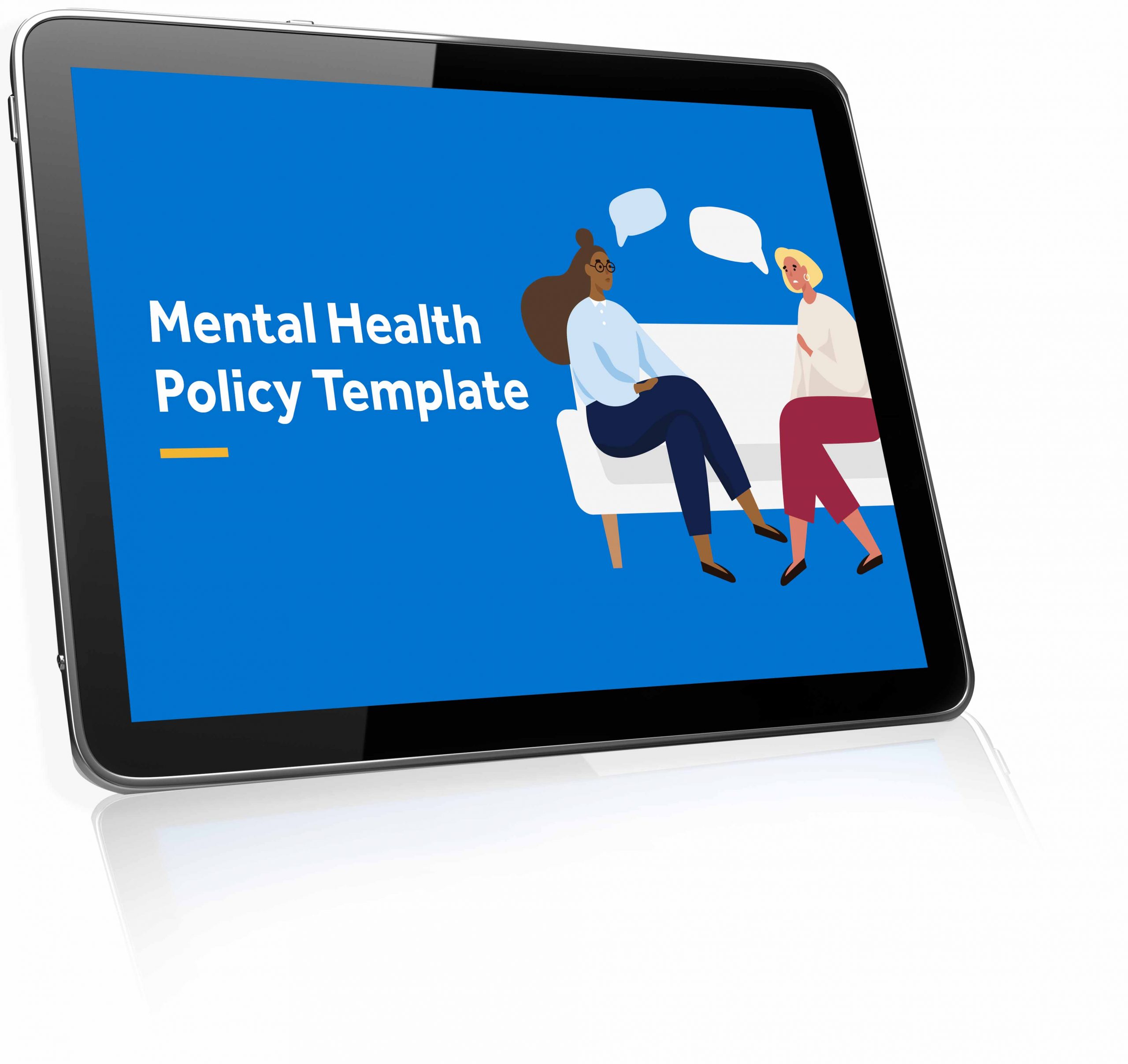
A study by the Health Promotion Agency in 2020 found that 1 in 5 people experience medium to high levels of mental distress. Given that work is one of the biggest stressors, and takes up most of your week, employers can have a major impact on the mental health and wellbeing of their employees. An effective way to improve health and wellbeing is to promote mental health awareness in the workplace.
What is Mental Health?
Mental illness or mental health conditions are often misunderstood. It’s an expression that we use frequently without understanding the complexities involved. Mental health is the general emotional and cognitive wellbeing of a person; how they think, feel, behave and interact with others.
Mental health problems or illnesses can range from a temporary concern to an ongoing condition; often, people may not react well to the ongoing stresses of life.
On the other hand, some employees may be suffering from an ongoing mental illness or be more perceptible to poor mental health.
Understanding Mental Illness
The high proportions of people suffering from mental distress leads us to believe that most New Zealanders will be affected by mental distress at some point in their lives. The mental health of younger people is also of particular concern. Young people in New Zealand have one of the highest suicide rates according to a report. Although most New Zealanders report being able to cope with stresses and live fulfilling lives, young people are more likely to feel that they are not coping with tough times. Young people are also more likely to have long term psychological or mental health conditions that affect them and their families.
Common mental health conditions reported include anxiety and depressive symptoms.
Mental health problems, illnesses and outcomes should be considered in the same way physical health problems, illnesses and outcomes are considered. For example, if an employee works in the sun without protection, then they are more likely to get sunburnt (problem) and this may lead to skin cancer (illness). If an employee witnesses a workplace accident, they may – obviously – be emotionally affected; if left untreated, their experience may affect their long-term mental health.

Mental Health Policy Template
Mental Health has emerged as a major focus for workplace safety. COVID-19 and the ‘working from home’ environment has only highlighted the issue further, and the obligations on employers to provide a mentally healthy workplace.
A solid, comprehensive and responsive Mental Health Policy is an essential document in identifying mental health risks, properly supporting those who may be suffering and protecting your business with the right documentation.
Importance of Mental Health Awareness
There is an increasing amount of evidence that workplaces can play an important role in maintaining the mental health and wellbeing of employees and communities. From the statistics quoted above, we know that these conditions affect a huge proportion of the population. Imagine if you have a work environment where employees feel safe, supported, and comfortable that they can put their hand up and admit they are struggling. With majority of those affected by mental health conditions being of working age, your work environment can play a huge role in supporting those in need.
1. Awareness Reduces Mental Health Stigmatization
Mental illness discrimination in New Zealand has a long history. There are negative beliefs in the community about people who experience mental distress. These negative beliefs can lead to exclusion from society, exclusion in other ways, and stigma around working with people suffering from mental illness. This stigma can lead to those suffering from mental health issues having their concerns not acknowledged or even dismissed.
As an employer, encouraging awareness of mental health issues can assist any employees who may be suffering from mental health illnesses. Encouraging awareness of mental health can be as simple as communicating to your staff that you acknowledge the existence and commonality of mental health issues and will listen to any staff who would like to discuss their mental wellbeing in the workplace.
2. It Improves Employee Productivity and Company Performance
When someone exercises and keeps a good diet, they will naturally feel more energised and will likely to be more productive at work. Similarly, an employee who is mentally healthy will likely be more productive at work.
Poor mental health may also affect employee’s performance, decision making, workflow, and relationships at work, seriously impacting their work life. Absenteeism may also be caused by mental wellbeing.
New Era for Mental Health at Work
The recent disruption and radical shift in work environments have given rise to a new era for mental health at work. The conversation is shifting, and employees are demanding sustainable efforts and development that involves active research and change. Positive mental health is more than a buzzword, it is a focus for employees and employers in the coming years. Employees don’t want fancy wellness initiatives; they want active and mentally healthy workplaces.
They are seeking to contribute to this change and participate in the progress that can impact development of mental health at the workplace. Good mental health is all about using all the tools and resources available to you in enhancing your wellbeing.
How Do You Promote Mental Health Awareness?
Here are a few tips for promoting mental health awareness:
1. Don’t Treat Mental Health as a Taboo Topic
Speak openly about mental health with your employees. Encourage your staff to support each other and have open, honest conversations around mental health. Shifting the focus from the stigma or the negative connotations of mental illness can act as a first step in promoting mental health awareness.
2. Be Kind
You can never know who is struggling or has a past lived experience of mental illness and distress. Therefore, it is important to be kind and considerate. Avoid using hurtful or derogatory language, such as ‘psycho’. Also saying trite things when someone admits they are struggling or in recovery can make them feel unheard or dismissed. Be kind and empathetic to your employees.
3. Provide Tools and Resources Around the Workplace
Something as simple as creating and posting signs and providing resources (such as brochures, articles, phone numbers for services, etc) about mental health, and how your business is willing to support employees can make a vast improvement.
4. Be Attentive and Be There When Needed
If you notice an employee behaving uncharacteristically, don’t be quick to judge or assume how they are feeling. Reach out to them. Reconnect with the people around you and ask them what they need from you. Are they suffering from stress or is it something deeper?
5. Educate and Train Staff
Another option is to educate and train staff about mental health. For instance, you could set up training with your managers to help them better identify and deal with mental health issues in your workforce.
6. Implement a Mental Health Policy
A solid, comprehensive and responsive mental health policy is an essential document in identifying mental health risks, properly supporting those who may be suffering and protecting your business with the right documentation.
7. Top-down approach
Employee mental health does not function in isolation. Leaders should start taking charge of the conversation and serve as allies. Staff may hesitate to discuss mental health at work unless they see their managers championing the cause and fighting discrimination.

Get Workplace Advice Now
Employsure can help you with your WHS and Workplace Relations. Call now for free, initial advice
Frequently Asked Questions
Why Is It Important To Raise Awareness About Depression?
It is important to raise awareness about depression as it can help remove the stigma surrounding the illness. Removing the stigma may lead to improved mental health outcomes: for example, your employees may become more proactive in dealing with any symptoms of depression.
When is Mental Health Awareness Week in New Zealand?
Mental Health Awareness Week occurred from 26 September- 2 October this year.
How Can I Raise Awareness for Mental Health in The Workplace?
You can raise awareness of mental health in a few ways. For instance, you can provide a mental health policy, educate and train your staff on the topic; and provide signs and resources that encourage your employees to keep abreast of their own mental wellbeing.
